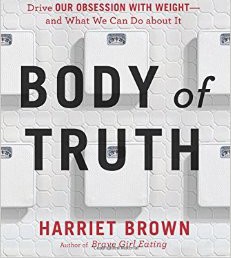This book is a great read for anyone working in a health field. Harriet Brown does a very effective job pointing out the many, and often insideous, ways in which our culture perpetuates biases around body image and weight that are destructive rather than productive. Most importantly, she takes a hard look at the science and points out that many common beliefs around weight and health are not scientifically substantiated. Read on for some more highlights!
OBESITY HAS NOT BEEN CAUSILY LINKED TO HEALTH DISASTERS
This is a big one for me because as a trainer I am regularly confronted with the tricky task of sifting through and trying to decide what is good, middle, or downright shoddy science. When dealing with something as complex as the human body this can be very difficult because you can never control for all of the many variables involved. This makes it extrememly difficult to decide if phenomena are causily linked or merely correlated.
The problem with obesity, Brown states, is that although we know in theory about the difference between correlation and causation, when it comes to obesity we don’t act like it. She gives many examples of the way in which we have actually fully integrated the idea that being overweight is a dire medical problem, regardless of other markers such as bloodwork. The danger here is that this focus on weight and weight loss can get in the way of more careful, and more insightful, assessments of health and wellness.
MARKERS LIKE BMI RANGES ARE OFTEN CHANGED
Another important point that she raises is the question of how we measure obesity. We all take for granted that obesity, especially amongst children, is on the rise. Brown notes that we must be careful with this assessment because there is more than one factor at work here. Most strikingly, BMI values for the categories overweight and obese were changed in 1997. Overnight hundreds of thousands of people went from the normal weight into the overweight and the overweight into the obese categories, not because their weight changed but because the BMI chart did. This is important to keep in mind because we all tend to hear only “obesity is on the rise” and draw the conclusion that we are all getting fatter by the minute. The recent decision to classify obesity as a disease almost certainly added to this impression.
THIN PEOPLE CAN GET AWAY WITH A LOT
This one takes a little inner reflection, but I believe it is true. When we see an overweight or obese person eating something we deem ‘unhealthy’ I think we are much quicker to judge that person as lacking self control. We judge these people as morally flawed for the weight that we see as unacceptable. How many of us judge thinner people the same way? In fact, haven’t we all heard this reply to a thin person who says the shouldn’t eat something: “oh please, you look great, you can eat anything! I’m the one who needs to watch what they eat!”
One of the worst things we do is judge each other. Given how little certainty there is about what we assume to be true about weight we should really be wary of this kind of thinking.
ALL OUR WEIGHT LOSS STRATEGIES HAVE FAILED TO WORK
Lastly, and perhaps most importantly, there is the fact that in spite of all the things we think we know about weight and health we certainly, unequivocally, have not found a way to change it. Nevertheless we continue to run full speed towards the same old, same old. We tell people to diet, exercise more, be more responsible and often and most damagingly, to feel some shame and shape up. So far, this hasn’t changed a thing. From fat shaming to exercise addiction, anorexia to bariatric surgery, we still, by our very own standards, continually fail to make progress. Perhaps it is time to say we don’t all look like the cover of a magazine and we don’t have to to be healthy. Once we embrace that with an open mind, perhaps we can find ways to actually improve health.
FINAL THOUGHTS
My one criticism of this book is that sometimes, you can get the impression Brown is saying that there is nothing wrong with our weight or our health habits. She does not in fact say this, nor does she have any intention of saying that (as far as I can tell) but sometimes it feels that way. I would therefore like to emphasize that the real point here is that we all need to focus on good habits more than we focus on our looks. We all can find ways to be a healthier, from eating more fruits and vegetables to sleeping more, moving more, or cutting back on some indulgences. And any of that could have a positive impact on our body composition. What Brown is saying, and what I feel is true, is that we should not make weight and body image the bottom line of whether or not we view ourselves as healthy.
Brown, Harriet. Body of Truth. Boston, Ma; Da Capo Press, 2015

Pingback: Treadmill Desks Don't Work - Or Do They? - do the movement April 29, 2015
[…] of this check out Harriet Brown’s book Body of Truth, which I blogged about in my last book review. The short is that although we have wedded ourselves culturally to the idea that weight indicates […]
Pingback: Fitness Communication: Stigma and the Obesity Paradox - do the movement November 28, 2015
[…] as we tend to believe when it comes to overweight and obesity. For more on that check out my Book Review – Body of Truth, which is a rundown on a very interesting book by the same […]
Pingback: Focus On Habits, Not Body Image - do the movement June 14, 2016
[…] Book Review – Body of Truth […]